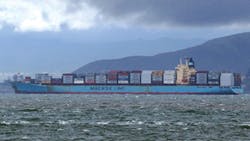The labor dispute at the U.S. West Coast ports may have ended, but its impact on manufacturers could be long and lingering as it exposed vulnerabilities within the global supply chain. Gene Seroka, executive director of the Port of Los Angeles, has estimated that it could take as much as three months to clear up the backlog of containers from cargo ships that were anchored offshore during the work slowdown. And a Wall Street Journal report estimates that it could take up to six months to get back to business-as-usual at all 29 West Coast ports affected by the dispute.
More than 70% of all imports from Asia enter the United States through one of the West Coast ports, and the labor slowdown made it both difficult and expensive for foreign-based automakers to get the parts they needed to supply their U.S. operations. Honda, for instance, reacted by slowing production at three North American plants for a week. Toyota cut overtime at some plants. And Fuji Heavy Industries, makers of Subaru automobiles, shifted from ocean to air freight to get parts to its U.S.-based plants -- a modal shift that, while effective, cost the company an extra $59 million per month and cut deeply into profitability.
"The biggest risk to any company is losing profitability or competitiveness," points out Lou Cerny, vice president of supply chain consulting firm Sedlak Management Consultants.
Supply chain visibility and traceability solutions offer ways that manufacturers can track and verify the movement of their goods while in-transit, but what happens when you know exactly where your parts are but you can't get them delivered to your plant on time because they're sitting in a harbor or on a dock? Using alternative suppliers or greatly exceeding your transportation budget to expedite the shipment of critical parts might work in the short term, but how do you mitigate risk over the long term?
One way, suggests Harry Moser, founder and president of the Reshoring Initiative, is to adopt a strategy centered on avoiding the ports as much as possible and favoring domestic production.
"The dock dispute was a short-term disaster for many companies," Moser says, "but if it motivates U.S.-based manufacturers and retailers to reevaluate their supply chains and reshore, the long-term impact will be overwhelmingly favorable." He points out that the U.S. stands to gain more from the localization trend than any other country because it also has the world's largest trade deficit, of between $500 billion to $600 billion per year.
Jon Hall, executive vice president with FM Global, an insurance company focused on risk management, adds that having auxiliary distribution centers in multiple regions is another way of ensuring business continuity in the event of an unplanned-for disruption. Having an expanded DC network, he says, "can minimize supply chain disruptions and lead to quicker delivery times to customers as well as reduced transportation costs compared to normal business conditions."
About the Author
Dave Blanchard
Senior Director of Content
Focus: Supply Chain
Call: (941) 208-4370
Follow on Twitter @SupplyChainDave
During his career Dave Blanchard has led the editorial management of many of Endeavor Business Media's best-known brands, including IndustryWeek, EHS Today, Material Handling & Logistics, Logistics Today, Supply Chain Technology News, and Business Finance. He also serves as senior content director of the annual Safety Leadership Conference. With over 30 years of B2B media experience, Dave literally wrote the book on supply chain management, Supply Chain Management Best Practices (John Wiley & Sons, 2010), which has been translated into several languages and is currently in its second edition. He is a frequent speaker and moderator at major trade shows and conferences, and has won numerous awards for writing and editing. He is a voting member of the jury of the Logistics Hall of Fame, and is a graduate of Northern Illinois University.

